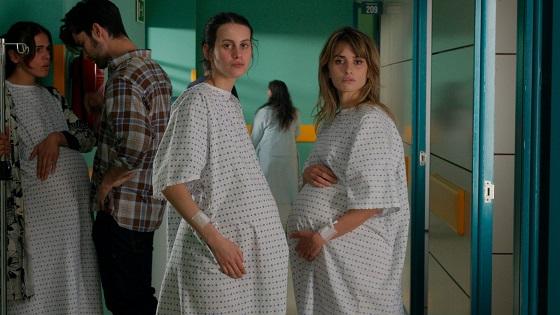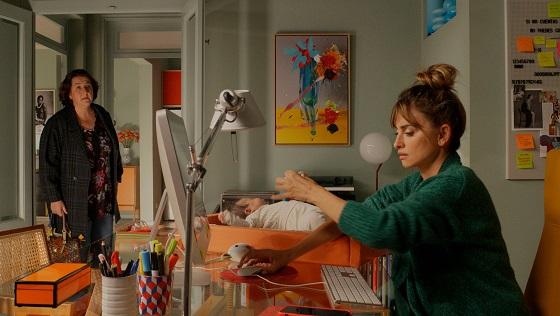

[Rating: Rock Fist Way Up]
In Theaters Friday, January 21.
A layered meditation on family, legacy, and fighting to find one’s place in the world, Parallel Mothers hits on more levels than one might expect. A thematic two-hander that alternates between soapy drama and ideas related to a shared national memory, the film by Spain’s cinematic maestro, Pedro Almodóvar, draws its audience in with rich, textured character work that gradually expands from the micro to the macro. The result is an emotional synthesis of seemingly conflicting ideas which, like the characters, find some common ground and a greater understanding of the larger world surrounding and connecting them.
As the movie title suggests, the story is guided by two mothers, Janis (Penélope Cruz) and Ana (Milena Smit), who meet in their shared room of a Madrid maternity ward. They both give birth to girls around the same time, and become fast friends, yet the two women are in very different places in their lives as they approach motherhood. Janis is a successful photographer in her 40s who is delighted to be having a child, while Ana is an unemployed teenager justifiably terrified at the prospect.
Motherhood seems to suit both of them, however, and while developments in their personal lives present different challenges (Ana with her flaky actress mother who barely has time to help with the baby, and Janis with an absent-minded student nanny), their roles as dedicated, loving mothers anchor and sustain them. That is until Janis orders a DNA kit, which comes after the father, forensic anthropologist Arturo (Israel Elejalde), makes it clear that Janis’ baby is not his. The accusation enrages her, yet it is something Janis only half-heartedly disputes despite the fact that she’d only been with one man, Arturo, during the period in question. Ana’s situation also takes a turn when her baby has a medical issue, which bring her and Janis back together in a way that helps both heal and move on…for a time.
There’s also a running B-plot about Janis campaigning to have Arturo’s foundation perform an excavation of her great grandfather’s alleged execution site, which potentially contains other remains owing to Franco’s fascists. The movie opens with this thread only to seemingly lose sight of it for over an hour, yet as Parallel Mothers dives into its third act, one realizes that it was always there, under the surface and waiting for the impact of its discovery to bring closure to the larger story (much like the bodies of the victims themselves). To say much more would potentially spoil some of the more stunning turns of the film, which Almodóvar uses with restrained precision to allow the story to progress simultaneously (parallel?) on narrative and thematic levels.

Put simply, it’s nothing less than masterful. Almodóvar, long championed for his portrayal of strong female characters, genre deployment, sexual elasticity, and diegesis innovation, is throwing all his pitches in this one and straight-up painting the corners with them. The script (also penned by Almodóvar) is like a Russian nesting doll brimming with ideas, surrounded by context, and wrapped further still by symbolism and thematic echo. Janis and Ana’s struggles as single mothers are both in line with the tradition of their families, but also offer a chance to break the cycle of generations of parents who weren’t there for their kids. Whether it was the wild 60s, fascist death squads, or touring theater obligations, something is keeping parents away from their children in these families, giving Ana and Janis the opportunity to do better, to be better.
They can’t do this alone, but it’s more than just the literal interpretation of this. Ana and Janis need each other and the friends/family in their lives (“it takes a village” etc. etc.), but they also need to wire themselves into their past on both the personal and broader national level. Janis’ attempts to reveal the truth about her great grandfather’s final moments mirrors Spain’s efforts to dig up rather than bury (or leave buried) the trauma of its past. How Ana and Janis manage their trauma as mothers is a microcosm of this broader national journey, and as the third act unfolds this all becomes achingly clear.

And while Smit is fantastic as the young woman who grows into her adulthood before the audience’s eyes, none of this works without Cruz’s vulnerable ferocity. At times the heroine as well as the villain, alternating between victim and oppressor, Cruz makes a case for her second Oscar (this time for Best Actress). The film doesn’t take any shortcuts, and wouldn’t work if its lead did, forcing Cruz through an emotional gauntlet that’s traversed with seeming ease.
What’s more, Almodóvar’s use of music informs the audience of each scene’s intention, at times harkening towards his trademark kitsch via telenovela cues, which also serves as commentary for this material. When Parallel Mothers moves into more solemn territory it abandons this soundtrack, yet it’s inclusion during profoundly dramatic moments seems to imply that Almodóvar and the movie itself see little distinction between these worlds: that the everyday struggle of single mothers and the reconciliation of Spain’s national memory exist as part of the same spiritual fabric.
So yeah: this is a hell of a movie. Narratively rich and stocked with complex characters played by actors at the top of their games (and deployed with expert precision by a near-unrivalled master behind the camera), Parallel Mothers is as fascinating as it is moving. Blending kitschy, disposable drama with the profoundly sincere, Almodóvar merges not just genre, but his audience’s understanding of what it means to live simultaneously in the past, present, and future. Like the featured mothers, these notions run parallel to each other, yet still manage to prop each other up: one hell of an impressive trick if ever there was one.





Comments on this entry are closed.